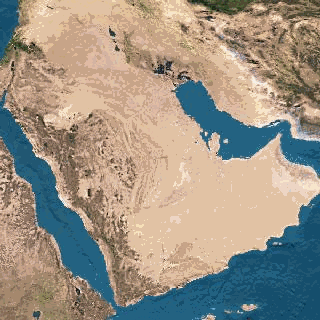Military Satellites Included In Massive U.S.-Saudi Arms Deal; Pressure Is On For France

The Arabian Peninsula from space. Image courtesy of NASA.
Details are emerging about the U.S.$110 billion arms deal struck between the United States and the Kingdom of Saudi Arabia during the visit of President Donald J. Trump to Riyadh in May 2017.
The main focus of the massive arms package on offer to Saudi Arabia are precision strike and missile defence capabilities, but several weeks after President Trump’s visit it has been revealed that sophisticated military satellite systems have also been proposed to Saudi defence officials.
Saudi Arabia has been offered two high-resolution reconnaissance satellites said to be worth U.S.$800 million and two satellite communication and ballistic missile early warning satellites valued at U.S.$4 billion.
Saudi Arabia has been in the market for high-resolution reconnaissance satellites for several years now. A French consortium consisting of Airbus and Thales Alenia Space, and backed by senior French political leadership, have been trying to sell Riyadh 2-8 satellites believed to be a version of the French Pléiades remote sensing satellite. U.S. company Orbital ATK has also been lobbying Saudi officials to buy their satellite reconnaissance systems, and the visit to Riyadh by President Trump and the attendant arms deal is thought to be a major boost to Orbital ATK’s case.
Another U.S. company, Lockheed Martin, is already building sophisticated satellite communication systems for Arabsat, though Boeing, Raytheon, Orbital ATK, and Space Systems Loral (SSL) could also be in the running to build the two communications satellites said to be a part of the U.S. package for Saudi Arabia.
What is not clear from reports is whether the communications satellites will host ballistic missile early warning payloads with infrared sensors that can detect ballistic missile launches and then initiate Saudi, and perhaps even Gulf Cooperation Council (GCC), missile defence systems to counter such threats, or whether these sensors will be placed on their own satellites.
If the proposal is to include stand-alone ballistic missile early warning satellites then Lockheed Martin are likely to be the favourites to win a contract. If, however, a hosted payload solution is selected then other U.S. satellite manufacturers may be in with a chance, though it is likely that Northrop Grumman will build the infrared sensors in any event.
Given Saudi defence priorities the military satellite package on offer may not be an immediate agenda item for Riyadh, though all of the capabilities on offer are integral to effective precision strike and missile defence complexes. Regardless of immediate Saudi priorities, however, U.S. satellite systems have received a huge commercial and political boost with President Trump’s Riyadh visit, placing a lot of pressure on French companies to remain relevant to Saudi military space needs.
With reported delays to the United Arab Emirates’ Falcon Eye satellite reconnaissance programme – also based on the Pléiades remote sensing satellite – due to issues with its Airbus-Thales Alenia Space manufacturer, questions are likely to be raised by Saudi defence officials about the current French offer.
All of this may well be moot for U.S. companies, however, given the ongoing fallout between Qatar on one hand, and Saudi Arabia, UAE, Bahrain, and Egypt on the other, over allegations about Qatari relations with Iran and terrorist financing. With a diplomatic solution to the crisis so far elusive, Senator Bob Corker (Republican – Tennessee) – the powerful chairman of the U.S. Senate’s Foreign Relations Committee – has threatened to block the entire U.S.$110 billion arms package in order to pressure Saudi Arabia to bring about a diplomatic solution with Qatar.









